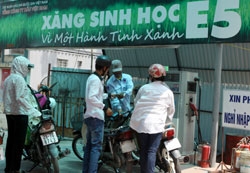
The Ministry of Industry and Trade will promote the consumption of biofuel by providing more information on the economic and environmental advantages of the vegetable–derived petrol alternative.
 |
| People buy ethanol-blended fuel at a PetroVietnam petrol station in Ha Noi. The Ministry of Industry and Trade is promoting the product due to its economic and environmental advantages. |
The Ministry of Industry and Trade will promote the consumption of biofuel by providing more information on the economic and environmental advantages of the vegetable–derived petrol alternative.
"The ministry has submitted the Government with a development plan for biofuel production and consumption, which is expected to be approved this year," said Nguyen Phu Cuong, deputy head of MoIT's department of Science and Technology.
"The plan will include a measure that makes using a set amount of biofuel compulsory in some big cities," he added.
Most biofuels generate 70 per cent less CO2 emissions and 30 per cent less poisonous chemical emissions than petrol, while some types made from sugar are even cleaner.
Traditional fuels like coal and natural gas produce more greenhouse gases, take longer to disintegrate and are more harmful to water and land resources. They also cause more wear and tear to engines.
Despite the advantages, biofuel has yet to catch the popular imagination. Cuong said despite it being commercially available since 2010, it only has enjoyed a tiny market share compared to conventional fuel.
He attributed the low demand for biofuel to a lack of awareness about its advantages, and the old habits of consumers relying on fossil fuels. The number of biofuel retailers is also limited, with only 150 stations nationwide currently providing it.
"We need to have better storage infrastructure and distribution network in order to popularise the fuel," Cuong acknowledged.
Under the new plan to promote the development of the fuel up to 2015 (and with a vision further ahead to 2025), Viet Nam will produce 1.8 million tonnes of ethanol and vegetable oils for use as fuel annually, which will meet 5 per cent of domestic petrol and diesel demand in the next 15 years.
Private companies are set to contribute to meeting the demand. Two Dong Xanh Company factories in central Quang Nam Province began production of biofuel in August 2010 and have a capacity of providing 130 million litres a year.
Construction of a new Tung Lam factory in southern Dong Nai Province is also underway, and will create 70 million litres of the fuel annually when operational.
Meanwhile, the Viet Nam Oil and Gas Group (PetroVietnam) has kicked off the construction of three ethanol factories in northern Phu Tho, central Dung Quat and southern Binh Phuoc, each of which will have a capacity of 100 million litres a year.
According to the Ministry of Science and Technology, biofuel can be used as a fuel for vehicles in its pure form, but it is usually used as a diesel additive to reduce levels of particulate matter, carbon monoxide, and hydrocarbons in emissions.
(Source:VNS)





